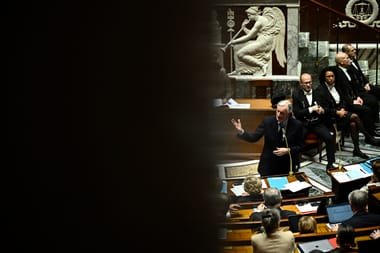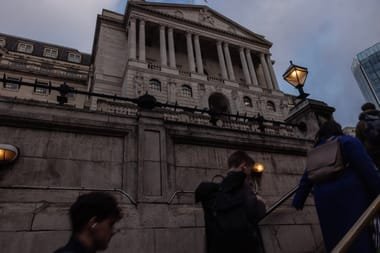The financial storm Prime Minister Michel Barnier said would follow if he was toppled hasn’t materialized. Was he exaggerating or are markets simply being complacent?

PARIS — France doesn’t have a government or a budget for next year — but you wouldn’t know it from the eerily quiet reaction from financial markets.
Some politicians, including Michel Barnier himself, who was toppled as French prime minister after losing a vote of no confidence on Wednesday, warned his firing would send markets into a tailspin as investors fretted about paralysis in the eurozone’s second biggest economy, potentially destabilizing the entire bloc.
But France’s benchmark stock market index, the CAC 40, actually rose, and one of the best barometers of political risk, the difference between French 10-year bond yields and those of Germany, also showed no sign of alarm.
“There was no market movement because there was no element of surprise,” said Léo Barincou, senior French economist at Oxford Economics.
The absence of drama was just as clear in Brussels, where even the European Commission on Thursday downplayed the gravity of the situation, stressing that France’s financial basics are in good shape despite its massive debt.
Experts believe that the main reason for this deafening silence, besides the anticipation factor, is that this is still a debt crisis unfolding in slow motion. France may be navigating uncharted waters, but they’ve decided not to worry, at least for now.
“This crisis is going to continue for quite some time,” said S&P Global Market Intelligence Vice President Ken Wattret. “So far, the financial markets’ response to it has been relatively benign,” he said, warning that the reaction could worsen “the longer it continues.”
The eurozone’s bad student
France is facing a so-called excessive deficit procedure in Brussels for overspending last year. Paris forecasts its deficit — the difference between how much it spends and how much it brings in every year — will hit 6.2 percent of gross domestic product this year, twice as much as the European Union limit. More worryingly, the gap is widening even as the strains on the public purse from the pandemic and the invasion of Ukraine recede across most of the continent.
Most worryingly of all, however, this has not come out of the blue. France’s deficit has been below 3 percent of GDP in only three of the last 22 years, as successive governments have put off structural reforms.
Barnier’s budget plans, which included €40 billion of spending cuts and €20 billion of tax hikes, had reassured the Commission that, this time, Paris was serious. In a show of good faith, the Commission had accepted a preliminary plan outlining a steady decline in the deficit over the next few years and had declined to elaborate on what would happen if Barnier’s budget proposals were rejected.
That extended a long tradition in Brussels, where the first rule of French budget deficits is that you don’t talk about French budget deficits. Both in 2003 and again in 2014, France had flouted existing deficit rules and avoided sanctions — “parce que c’est la France,” as then-Commission President Jean-Claude Juncker once put it.
The Commission launched an excessive deficit procedure against France earlier this year, albeit in a new framework where the risk of sanctions is all but eliminated. But there still seems to be an omertà in force. At her appearance before the European Parliament’s Economic and Monetary Affairs Committee on Thursday, European Central Bank President Christine Lagarde shut down any attempt to raise the issue of what might happen in case the bond markets truly took fright.

“I will not talk about individual countries,” she said in response to a question which referenced France, before giving a hearty “yes” to the next question, when asked specifically whether Germany should raise its level of public investment.
The topic is also likely to come up at a meeting of EU finance ministers in Brussels next week even if, of course, it is not on the official agenda.
“There is no pressure, no intention, to convey any particular messages to France,” said a senior EU official ahead of the meeting. “What France is going through is a parliamentary constitutional process. It is a politically complicated situation, but you just have to respect the democratic processes.”
The same official said the new French government might have to send the Commission a new deficit-reduction trajectory for the coming years.
What happens to Barnier’s budget?
There are other, better reasons not to make more of a drama over what is happening. France may now miss a year-end deadline for adopting its general budget and social security law for next year, but there is no real risk of a United States-style government shutdown: Experts agree that Barnier (as caretaker prime minister) or his successor could still adopt a so-called special law, which would allow the state to effectively carry over the previous year’s budget until a new one is adopted.
Marine Le Pen, who contributed to bringing down Barnier joining forces with the left, said her National Rally party would vote to approve that special law.
Copy-pasting last year’s budget means that, contrary to what it promised, France won’t be cutting its deficit. Budget Minister Laurent Saint-Martin has argued it could widen further to 7 percent of GDP.
However, if not getting better, the situation might at least not get much worse. The French economy is still set to grow next year, providing a bigger taxable base. Many spending elements would rise in line with inflation, but so would some tax receipts.
Moreover, the ECB is expected to keep cutting its interest rates next year, which should keep a lid on its debt servicing costs. And unlike Greece and Portugal 14 years ago, France doesn’t have a yawning current account deficit. It is not dependent on the “kindness of strangers” to fund its government.
But while Barnier’s budget plans were music to the Commission’s ears, things might be more difficult with a possible new budget or a copy-paste of last year’s. For Guntram Wolff, an economist at Bruegel, the mess will test how serious Brussels is when it comes to enforcing its revamped spending rules.
“The Commission, at the end of the day, has to follow the rules, and has to follow the rules in an impartial way, really also when it comes to France,” he said.




